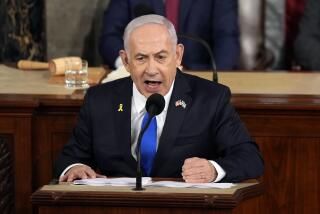Senate OKs Iraq Sanctions Over Chemical Arms
WASHINGTON — The Senate, striving to take action against Iraqi chemical weapons abuses before the congressional session ends this week, Tuesday unanimously approved a package of economic sanctions against the Middle East nation and added it to a complex package of tax adjustments headed for a key negotiating session with the House.
The sanctions measure is virtually identical to one passed overwhelming by the House and, with its 87-0 margin of passage, would seem to be veto-proof. However, its fate is uncertain because of the possibility of snags in the other tax issues before the House-Senate conference.
The measure would ban sales of equipment to Iraq that could be used for military purposes and would require the United States to oppose loans to Iraq by international financial institutions. Although the United States does not now sell weapons to Iraq, it does export $200 million worth of radios, electronic goods and machinery that could have military uses.
The new version, milder than one approved last month by the Senate, excluded any embargo of agricultural exports or credits, thereby removing the chief obstacle to a compromise with the House.
Sen. Jesse Helms (R-N.C.), a sponsor of the measure, said the United States must take some firm action against Iraq for its reported use of chemical weapons against Kurdish insurgents, even though the Reagan Administration has pressed for limiting the U.S. response to diplomatic protests.
Iraq has been guilty of “crimes against humanity,” Helms said. “The United States must not sit back and idly watch it proceed.”
The tax bill containing the Iraqi sanctions measure was composed primarily of technical corrections and clarifications of the 1986 tax reform law. Before passing it 87 to 1, the Senate overwhelmingly defeated a proposal by Sen. Bill Bradley (D-N.J.) to drop several tax breaks and use the $1.8 billion saved over three years for an anti-drug campaign.
“It is a question of priorities,” argued Bradley, who later cast the sole vote against the package. But Sen. Max Baucus (D-Mont.), floor manager of the bill, countered that it is senseless to “spend money on a bill that this body has not yet seen.”
Earlier, the Senate rejected by an 85-2 vote a Bradley proposal that would have liberalized a tax benefit designed to benefit low-income working families with children.
Also included in the tax correction legislation are measures that would:
--Allow families to avoid tax on interest earned on U.S. savings bonds redeemed to pay for college or vocational education.
--Require the Internal Revenue Service to inform taxpayers of their legal rights and ban collections quotas for agents.
--Require federal purchase of 540 acres of land 30 miles west of Washington at the site of the Second Battle of Manassas to block construction of a shopping mall.
--Deny all deductions for business purposes of the basic monthly charge for a home telephone.
More to Read
Get the L.A. Times Politics newsletter
Deeply reported insights into legislation, politics and policy from Sacramento, Washington and beyond. In your inbox three times per week.
You may occasionally receive promotional content from the Los Angeles Times.










